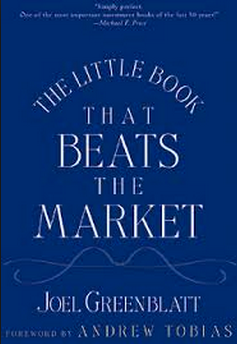New subscribers to Stockopedia can often be a little bewildered by the number of different Guru Screens that we model - I often find myself answering the question "where do I start?". We've modelled these 65 strategies from dozens of classic books and research papers and doing the background reading around it all could take a busy person years - years that they just don't have!
When it comes to answering this question I often find myself suggesting a read of "The Little Book that Beats the Market" by Joel Greenblatt. It's a title I recommend not only for it's brevity (it's only 150 short pages long) but also for it's brilliant summary of the principles of modern Value Investing and as an introduction to systematic investing.
The author, Joel Greenblatt, is to me the modern era's Benjamin Graham given the amount he has given back to the investment community since his success at the hedge fund Gotham Capital - where he returned 50% per year to his investors annualised for over a decade. Since closing the fund he has continued his investing success while teaching students at Columbia Business School and writing several highly recommended investment bestsellers.
Buy Good, Buy Cheap

In "The Little Book…" Greenblatt explains simply and clearly a systematic investing strategy based on a very understandable principle - that buying shares in cheap, good quality companies beats the market. The strategy ranks the stock market by 'cheapness', ranks the stock market by 'quality' and adds the two ranks. The 30 or so companies scoring most highly by this sum are then selected for purchase and rebalanced annually. Backtesting this strategy, Greenblatt claimed that it would have returned an astonishing 30.8% per year over the 17 year period to 2004.
It proved so effective that Greenblatt christened it 'The Magic Formula', creating in the process something of a cult. The book has sold hundreds of thousands of copies while institutional and individual investors the world over have been putting these principles to work. Morgan Stanley and Societe Generale are just two of the big international brokers that still track the strategy on a monthly basis. But as the years have rolled by Greenblatt's results have proven hard to replicate, both in backtesting by third parties, and in the wild of the market itself.










